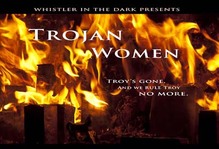
I bring this up for two reasons. One: I recently saw The Avengers (which was awesome). And two: Whistler in the Dark is not only producing Trojan Women, but through them I have put together (and will be moderating) the pilot panel of a new initiative called Scholars' Echoes, in which advanced doctoral candidates and recent PhDs from New England universities will be sharing their expertise with our audiences.
You may be wondering what these things have in common...
There is a conversation to be had about marketing to a built-in fan base, and another to be had about establishing and cultivating said fan base via carefully constructed products and their strategic release. And another just on branding as it relates to this franchise. But I want to talk specifically about narrative.
I've started referring to The Avengers is a compound sequel. It continues stories established in several other films and brings them together. The next event of note in Captain America's narrative as left off by the movie named for that character is that he joins the Avengers and saves the world. The same can be said for Thor, Iron Man, and the others. All of the earlier films provide backstory for The Avengers, and each central character's individual narrative comes into play in the ongoing story. This movie is not Iron Man III or Thor II (though those movies are probably in the works if I were to guess). This is a compound sequel built on the individual narratives established in the previous films.
We've seen this before in comic books of course, so it's no surprise that it would be a comic book movie that succeeded in being a compound sequel. But where else have we seen this?
Greek tragedy and Classical mythology.
We are familiar with many of the stories that make up the background narrative of Trojan Women. And many of those that come after. The Iliad and The Odyssey exist as foundational texts in our culture. We know the characters on some level, we've been told their stories. Those characters, or their actions, inhabit the worlds of Greek tragedy. Stories are built on other stories; we as an audience enter into the aftermath of one and the prequel of another. At the first rehearsal, our artistic director, Meg Taintor, said "I find stories about Troy to be some of the best stories we've told ourselves." This from a person who knows a thing or two about storytelling.
At the start of the play many of the earlier heroes of the story of Troy are already dead. Here we're dealing with consequences. Or perceived consequences, being that we know what happens in The Odyssey. We are still invested in the characters because they are the foundations of a larger narrative. And as many of the characters walk on stage, we know not only where they are coming from, but where they are going. We catch Cassandra, for example, on her way to Greece. Our investment in that character began long before we set foot in the theater. I can write at length about the talent and dedication of my colleagues at Whistler in the Dark and how it is their work that is really what makes this production worth seeing, but again, this post is about overarching narratives.
Something that is complementing the narrative in this case will be the Scholars' Echoes Response Panel. This is a new thing for us.
A couple of years ago I heard a colleague of mine who was studying dramaturgy at the Yale School of Drama describe talkbacks and panels and whatnot as the theatre's equivalent of the special features section of a DVD. The work stands alone. But the work has a pretty elaborate and significant backstory. And the work is in and of itself an element of a larger cultural backstory that goes back thousands of years. I am sure that when The Avengers is released on DVD, the special features section will be overflowing with backstory. In the theatre we perform our special features right in front of you.
I've assembled a group of people with the capacity to illuminate the work beyond the experience of the production itself. We have Ryan Hartigan, who is studying Theatre & Performance Studies at Brown, Sophie Klein, who is studying Classics at Boston University, and Dr. Hugh Long who is a dear friend and colleague from Tufts Drama and who is about to begin a new professorship in Alabama. All three have distinguished themselves as both artists and scholars, making them wonderful candidates for this particular special feature. We'll also have the good fortune to be joined by our translator, Dr. Francis Blessington.
The thing about having the special features live is in part the responsiveness of the interaction. I would wager that people are moved by events in Greek tragedy without being fully aware of why. I would say the same for other compound sequels. (I didn't see the most recent Hulk movie, but the burden that that character bears is profound.) Making a group of scholars available to an audience is a way of expanding the experience.
We do smart shows. We attract smart audiences. Part of those smarts is the understanding of the deeper roots of the stories being told. Let's have some smart conversations about it.
If you've read this far: I'd like to add that we're in the midst of Whistler's Annual Donor Drive. I can say without hesitation that I have done some of my best violence/movement compositions with and because of the artists involved in this company. I've also collaborated with them as a playwright, director, and now as a scholar.
Please consider supporting us. Every bit helps.
 RSS Feed
RSS Feed